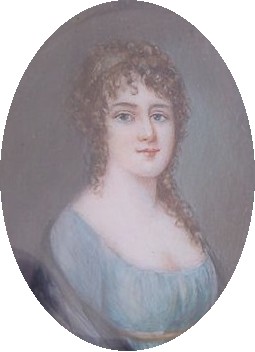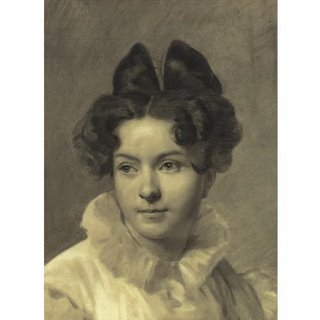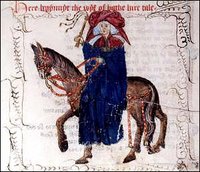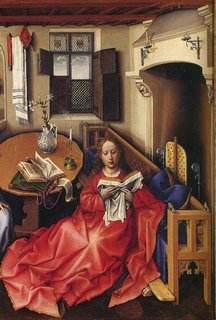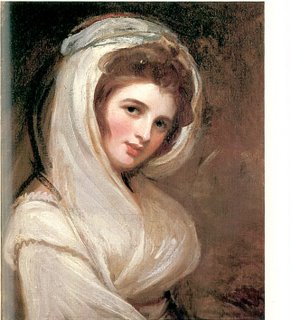
A few days ago, I was having dinner with some friends who are also Janeites, and we talked about the Jane Austen movies. Specifically, the Pride and Prejudices–1995 and 2005. One of my male friends made the comment that the ’95 Lizzy was obviously much prettier than Jane, thereby making the fact that everyone considered Jane the “famous local beauty” puzzling (an argument I’ve heard before). To modern eyes this is probably true–Jennifer Ehle is quite lovely, maybe more obviously so than Susannah Harker. But I do think Ms. Harker was a good choice for the part. She has very “classical” looks that would have appealed in the Regency period (she looks almost like a Grecian statue). Plus I thought she captured Jane’s serenity and sweetness (and slight dimwitedness) well.
In the 2005 P&P, it is more obvious. Rosamund Pike is so angelically pretty that it’s clear why she was so acclaimed in the neighborhood. Keira Knightley is also stunning (she was recently on the cover of Vogue twice within four months!), but in a more contemporary, angular way. It’s easy to see why she would capture Darcy’s fascination, but also why she was slightly overshadowed by her sister.
It’s so fascinating how each period has its own concept of “beauty,” and how and why those ideas change and evolve. I recently read a thesis that said “beautiful” equates with whatever is high maintenance. I.e., in the Renaissance, when food was scare and most people worked outdoors, “zaftig” and pale was In. Now, very slender and tan is in, when it costs money and time to join a gym and buy bronzer to combat our office-bred pallor and softness. Of course, there are always a few women who transcend whatever the fashion is and make their own style of beauty. And there are many (like myself) who will never be happy with their looks, and yet always will be searching the cosmetics counters for that “miracle in a jar.”
Here are a few quotes I found concerning women of the Regency who were renowned, in one way or another, for their style:
Lord Byron on Lady Caroline Lamb (who had a very “modern”, Keira Knightley-style beauty, being very slim and elfin): “The lady had scarcely any personal attractions to recommend her” and her figure “was too thin to be good” (from Benita Eisler’s “Byron: Child of Passion, Fool of Fame”
A Swedish diplomat on Emma Hamilton (seen in the portrait above): “she was the fattest woman I’ve ever laid eyes on, but with the most beautiful head”
And Lord Fitzharris: she is “without exception the most coarse, ill-mannered, disagreeable woman I’ve ever met”
An Anonymous observer: “She is indeed a Whapper: and I think her manner very vulgar”
(from David Howarth’s “Lord Nelson: The Immortal Memory”)
Madame de Remusant on Josephine Bonaparte: “her limbs were supple and delicate, all her movements easy and elegant”
Another Anonymous: “young and charming face, surrounded by a profusion of light hair, with a pair of large dark-blue eyes, and exhibiting altogether the image of the most graceful of sylphs”
(from “Josephine: A Life of the Empress” by Carolly Erickson)
Napoleon about Josephine: “…full of graceful charm–a woman in the fullest meaning of the term” (from Evangeline Bruce’s “Napoleon and Josephine: An Improbable Marriage”)
Mary Tickell (Sheridan’s sister-in-law) on Dora Jordan: “little she is and yet not insignificant in her figure, which, though short, has a certain roundness…which is very graceful”
Harriet Bessborough: “she is terribly Large, but her voice and acting still delightful”
And Leigh Hunt: “she was neither beautiful, nor handsome, nor even pretty, nor accomplished, nor a lady, yet was so pleasant, cordial, so natural…had such a shapely leg withal..that she appeared something superior to all those requirements of acceptability”
And Lady Spencer, her mother, on Georgiana Duchess of Devonshire, one of the most famous beauties of her day: “Without being very handsome or having a single good feature in her face, she is one of the most showy girls I ever saw” (thanks, Mom)
Horace Walpole: “without being a beauty; but her youth, figure, flowing good nature, sense and lively modesty make her a phenomenon.”
(from Amada Foreman’s “Georgiana, Duchess of Devonshire”)



